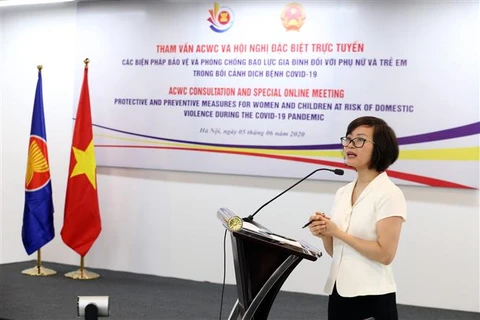Hanoi (VNS/VNA) - More than 70 percent of divorces in the past 10 years could be attributed to domestic violence, according to a recent report from the Ministry of Culture, Sports and Tourism.
The ministry’s report, which reviewed 12 years of implementing the Law on Domestic Violence Prevention and Control, showed that about 300,000 cases relating to domestic violence were reported nationwide in 2009-2019.
In 10 years, among nearly 1.4 million divorces, more than 1 million stemmed from domestic violence.
There were nearly 25,000 victims treated in medical establishments and 19,000 others were provided support by social welfare facilities.
The ministry said in 2009-2019, there were more than 33,000 cases of domestic violence that perpetrators were handled by authorities.
However, measures handling the perpetrators were mainly in the forms of comments, conciliation and criticism in residential areas, and administrative sanctions in the form of warning or fines. Those measures accounted for 73.6 percent.
Only in cases of intentional injury, torture, destruction of property, or murder were criminal charges brought.
The ministry admitted that comments, conciliation, criticism in the community, and administrative sanctions did not ensure deterrence. Besides, administrative procedures and conditions for handling domestic violence cases were still quite complex, especially provisions on writing denunciations.
Many victims were reluctant to contact authorities because they did not know how to present their situation and were even threatened by the perpetrators if they spoke up.
Efforts to ban perpetrators from contacting their victims have also been hamstrung, as often the victim of abuse is the one forced to leave their house. This can result in stigma from both their family and society.
In addition, victim support facilities did not operate effectively, with some facilities only listed in the law but not operating in practice.
Supporting victims of domestic violence in emergencies was still considered to be stymied by bureaucratism and not suitable when victims needed to be taken out of their home to protect their lives.
Currently, administrative sanctions in domestic violence prevention are inconsistent with the Vietnam Penal Code.
The Penal Code stipulates that "anyone who seriously offends the dignity and honour of another person will be subject to a warning or a fine of 10-30 million VND or a non-custodial reform for up to three years".
Meanwhile, offending the dignity and honour of another person is a form of mental violence, but the fine for this act when carried out by a family member was only 500,000 -1,500,000 VND per Article 51 of Decree 167/2013/NĐ-CP on administrative sanctions for domestic violence.
In many cases, the victims of violence who were the spouse or parent have to pay the fine or take money from the family expenditure fund.
This stopped victims from denouncing the perpetrators.
Many countries have replaced the fines with compulsory education, the report said./.
The ministry’s report, which reviewed 12 years of implementing the Law on Domestic Violence Prevention and Control, showed that about 300,000 cases relating to domestic violence were reported nationwide in 2009-2019.
In 10 years, among nearly 1.4 million divorces, more than 1 million stemmed from domestic violence.
There were nearly 25,000 victims treated in medical establishments and 19,000 others were provided support by social welfare facilities.
The ministry said in 2009-2019, there were more than 33,000 cases of domestic violence that perpetrators were handled by authorities.
However, measures handling the perpetrators were mainly in the forms of comments, conciliation and criticism in residential areas, and administrative sanctions in the form of warning or fines. Those measures accounted for 73.6 percent.
Only in cases of intentional injury, torture, destruction of property, or murder were criminal charges brought.
The ministry admitted that comments, conciliation, criticism in the community, and administrative sanctions did not ensure deterrence. Besides, administrative procedures and conditions for handling domestic violence cases were still quite complex, especially provisions on writing denunciations.
Many victims were reluctant to contact authorities because they did not know how to present their situation and were even threatened by the perpetrators if they spoke up.
Efforts to ban perpetrators from contacting their victims have also been hamstrung, as often the victim of abuse is the one forced to leave their house. This can result in stigma from both their family and society.
In addition, victim support facilities did not operate effectively, with some facilities only listed in the law but not operating in practice.
Supporting victims of domestic violence in emergencies was still considered to be stymied by bureaucratism and not suitable when victims needed to be taken out of their home to protect their lives.
Currently, administrative sanctions in domestic violence prevention are inconsistent with the Vietnam Penal Code.
The Penal Code stipulates that "anyone who seriously offends the dignity and honour of another person will be subject to a warning or a fine of 10-30 million VND or a non-custodial reform for up to three years".
Meanwhile, offending the dignity and honour of another person is a form of mental violence, but the fine for this act when carried out by a family member was only 500,000 -1,500,000 VND per Article 51 of Decree 167/2013/NĐ-CP on administrative sanctions for domestic violence.
In many cases, the victims of violence who were the spouse or parent have to pay the fine or take money from the family expenditure fund.
This stopped victims from denouncing the perpetrators.
Many countries have replaced the fines with compulsory education, the report said./.
VNA
























